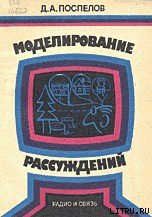Психология оценки и принятия решений - Плаус Скотт (читать книги онлайн бесплатно полностью без .txt) 📗
Nisbett, R. E., Ross, L. (1980). Human inference: Strategies and shortcomings of social judgment.Englewood Cliffs, NJ: Prentice-Hall. Nisbett, R. E., Schachter, S. (1966). Cognitive manipulation of pain.
Journal of Experimental Social Psychology, 2,227—236. Northcraft, G. В., Neale, M. A. (1987). Experts, amateurs, and real estate: An anchoring-and-adjustment perspective on property pricing decisions. Organizational Behavior and Human Decision Processes, 39,84—97. Orvis, B. R., Cunningham, J. D., Kelley, H. H. (1975). A closer examina-tionof causal inference: The roles of consensus, distinctiveness, and consistency information. Journal of Personality and Social Psychology, 32,605—616. Osberg, T. M., Shrauger, J. S. (1986). Self-prediction: Exploring the parameters of accuracy. Journal of Personality and Social Psychology, 51,1044-1057.
Oskamp, S. (1965). Overconfidence in case study judgments. Journal of Consulting Psychology, 29,261—265.
Paese, P. W., Sniezek, J. A. (1991). Influences on the appropriateness of confidence in judgment: Practice, effort, information, and decision making. Organizational Behavior and Human Decision Processes, 48,100—130.
Park, В., Rothbart, M. (1982). Perception of out-group homogeneity and levels of social categorization: Memory for the subordinate attributes of in-group and out-group members. Journal of Personality and Social Psychology, 42,1051-1068.
Paulos, J. A. (1986, November 24). Orders of magnitude. Newsweek,pp. 12-13.
Paulos, J. A. (1988). Innumeracy: Mathematical illiteracy and its cons equen-ces.New York: Vintage Books.
Payne, J. W. (1973). Alternative approaches to decision making under risk: Moments versus risk dimensions. Psychological Bulletin, 80,439—453.
Payne, J. W. (1982). Contingent decision behavior. Psychological Bulletin, 92,382-402.
Pennington, D. C, Rutter, D. R., McKenna, K., Morley, I. E. (1980). Estimating the outcome of a pregnancy test: Women's judgments in foresight and hindsight. British Journal of Social and Clinical Psychology, 19,317-324.
Peter, L. J. (1977). Peter's quotations: Ideas for our time.New York: Bantam
Books.
Peterson, С (1980). Recognition of noncontingency. Journal of Personality and Social Psychology, 38,727--734.
Peterson, C, Semmel, A., von Baeyer, C, Abramson, L. Y., Metalsky, G. L, Seligman, M. E. P. (1982). The Attributional Style Questionnaire. Cognitive Therapy and Research, 6,287—300.
342
Pettigrew, T. F. (1979). The ultimate attribution error: Extending Allport's cognitive analysis of prejudice. Personality and Social Psychology Bulletin, 5,461-476.
Phillips, L. D., Edwards, W. (1966). Conservatism in a simple probability inference task. Journal of Experimental Psychology, 72,346—354.
Pietromonaco, P. R., Nisbett, R. E. (1982). Swimming upstream against the fundamental attribution error: Subjects' weak generalizations from the Darley and Batson study. Social Behavior and Personality, 10,1—4.
Platt, J. (1973). Social traps. American Psychologist, 28,641—651.
Pious, S. (1989). Thinking the unthinkable: The effects of anchoring on likelihood estimates of nuclear war. Journal of Applied Social Psychology, 19,67-91.
Pious, S. (1989, March). Political illiteracy: A threat to international security. Swords and Ploughshares,pp. 9—10.
Pious, S. (1991). Biases in the assimilation of technological breakdowns: Do accidents make us safer? Journal of Applied Social Psychology, 21,1058—1082.
Pious, S., Zimbardo, P, G. (1984, November). The looking glass war. Psychology Today,pp. 48—59.
Pious, S., Zimbardo, P, G. (1986). Attributional biases among clinicians: A comparison of psychoanalysts and behavior therapists. Journal of Consulting and Clinical Psychology, 54,568—570.
Pool, R. (1988). The Allais Paradox. Science, 242,512.
Prothro, J. W., Grigg, С. М. (1960). Fundamental principles of democracy: Bases of agreement and disagreement. Journal of Politics, 22,276—294.
Pruitt, D. G., Hoge, R. D. (1965). Strength of the relationship between the value of an event and its subjective probability as a function of method of measurement. Journal of Personality and Social Psychology, 69,483—489.
Pryor, J. В., Kriss, N. (1977). The cognitive dynamics of salience in the attribution process. Journal of Personality and Social Psychology, 35,49—55.
Quattrone, G. A. (1982). Overattribution and unit formation: When behavior engulfs the person. Journal of Personality and Social Psychology, 42,593-607.
Quattrone, G. A., Lawrence, C. P., Warren, D. L., Souza-Silva, K., Finkel,S. E., Andrus, D. E. (1984). Explorations in anchoring: The effects of prior range, anchor extremity, and suggestive hints.Unpublished manuscript, Stanford University,Stanford.
Quattrone, G. A., Tversky, A. (1988). Contrasting rational and psychological analyses of political choice. American Political Science Review, 82,719-736. Reeder, G. D. (1982). Let's give the fundamental attribution error another
chance. Journal of Personality and Social Psychology, 43,341—344. Regan, D. Т., Straus, E., Fazio, R. (1974). Liking and the attribution process. Journal of Experimental Social Psychology, 10,385—397.
343
Regan, D. N., Totten, J. (1975). Empathy and attribution: Turning observers into actors. Journal of Personality and Social Psychology, 32,850—856.
Reichenbach, H. (1949). The theory of probability.Berkeley: University of California Press.
Reyes, R. M., Thompson, W. C, Bower, G. H. (1980). Judgmental biases resulting from differing availabilities of arguments. Journal of Personality and Social Psychology, 39,2—12.
Robbins, J. (1987). Diet for a new America.Walpole, NH: Stillpoint Publishing.
Rodin, J. (1986). Aging and health: Effects of the sense of control. Science, 233,1271-1276.
Ronis, D. L., Yates, J. F. (1987). Components of probability judgment accuracy: Individual consistency and effects of subject matter and assessment method. Organizational Behavior and Human Decision Processes, 40,193-218.
Rosenhan, D. L., Messick, S. (1966). Affect and expectation. Journal of Personality and Social Psychology, 3,38—44.
Rosenthal, R. (1976). Experimenter effects in behavioral research(enlarged ed.). New York: Irvington.
Rosenthal, R. (1987, December). Pygmalion effects: Existence, magnitude, and social importance. Educational Researcher,pp. 37—41.
Rosenthal, R., Fode, K. L. (1963). The effect of experimenter bias on the performance of the albino rat. Behavioral Science, 8,183—189.
Rosenthal, R., Jacobson, L. (1968). Pygmalion in the classroom: Teacher expectation and pupils' intellectual development.New York: Holt, Rinehart Winston.
Ross, L. (1977). The intuitive psychologist and his shortcomings: Distortions in the attribution process. In L. Berkowitz (Ed.), Advances in experimental social psychology(Vol. 10). New York: Academic Press. Ross, L., Lepper, M., Hubbard, M. (1975). Perseverance in self perception and social perception: Biased attributional processes in the debriefing paradigm. Journal of Personality and Social Psychology, 32,880—892. Ross, L., Lepper, M., Strack, F., Steinmetz, J. (1977). Social explanation and social expectation: Effects of real and hypothetical explanations on subjective likelihood. Journal of Personality and Social Psychology, 37,817—829. Ross, L., Rodin, J., Zimbardo, P. G. (1969). Toward an attribution therapy: The reduction of fear through induced cognitive-emotional misat-tribution. Journal of Personality and Social Psychology, 12,279—288. Ross, M., Sicoly, F. (1979). Egocentric biases in availability and attribution. Journal of Personality and Social Psychology, 37,322—336. Rothbart, M. (1970). Assessing the likelihood of a threatening event: English Canadians' evaluation of the Quebec separatist movement. Journal of Personality and Social Psychology, 15,109—117.

![Озарение [Версия без таблиц] - Логвинов В. Н. (книги онлайн TXT) 📗](/uploads/posts/books/63698/63698.jpg)
![Озарение [Версия с таблицами] - Логвинов В. Н. (смотреть онлайн бесплатно книга TXT) 📗](/uploads/posts/books/63699/63699.jpg)

